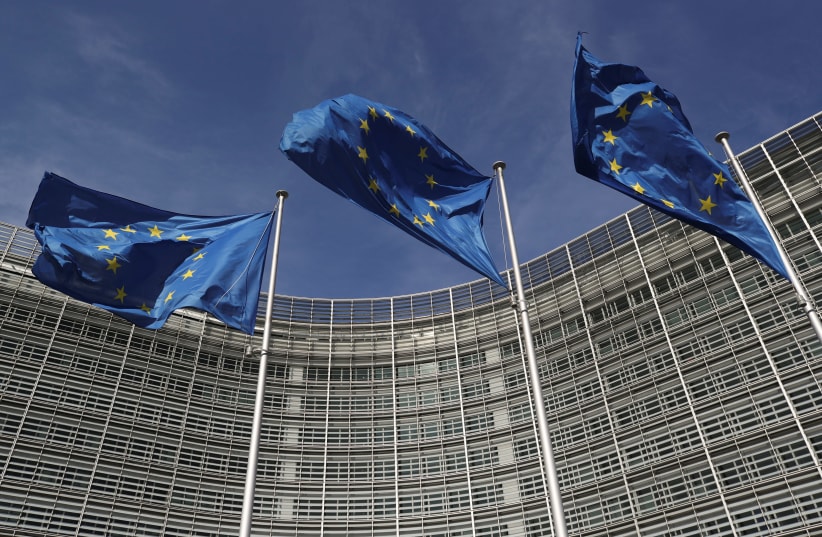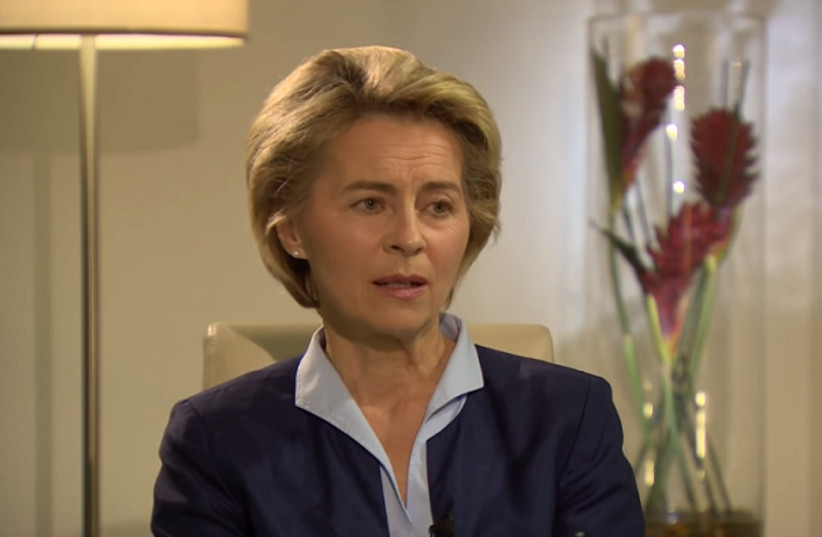The European Commission, the executive arm of the European Union, presented on Tuesday its first-ever comprehensive strategy for combating antisemitism and fostering Jewish life on the continent.
The report noted the ongoing rise of anti-Jewish hatred in Europe in recent years, which it ascribed to far-right and far-left radicals, along with Islamist extremists, and proposed a three-tiered strategy along with specific proposals to address the problem.
“Today we commit to fostering Jewish life in Europe in all its diversity,” said European Commission President Ursula von der Leyen.
“We want to see Jewish life thriving again in the heart of our communities… The strategy we are presenting today is a step-change in how we respond to antisemitism. Europe can only prosper when its Jewish communities feel safe and prosper,” said Von Der Leyen.
The Commission’s strategy document laid out “three pillars” in its goal to combat antisemitism and ensure that Jewish life in Europe continues to flourish.
The strategy seeks to prevent and combat antisemitism, protect and foster Jewish life in the EU and bolster education and research on these issues as well as Holocaust remembrance.
The Commission said that it will organize an annual civil society forum on combating antisemitism, and “support member states’ efforts in designating and implementing national strategies on combating antisemitism or discrimination.”
It also called on member states to develop those national strategies, if they had not already done so, appoint special envoys for combating antisemitism and fostering Jewish life and adopt and utilize the antisemitism definition of the International Holocaust Remembrance Alliance.
In terms of the goal of protecting and fostering Jewish life in the EU, the strategy document said that greater cooperation was needed “between public authorities and faith-based leaders and congregations, including Jewish ones,” to improve the level of security awareness.
The document said that the Commission will provide EU funding for the protection of public spaces and places of worship, and will continue to finance research to understand radicalization trends and means to prevent them.
The Commission said it would also step up operational support for member states and Jewish communities by providing security training and setting up a network of trainers for the protection of places of worship.
And regarding fostering Jewish life, the Commission said it would increase knowledge and understanding of Jewish life among the general public through an awareness-raising campaign conducted in cooperation with local Jewish communities.
The Commission will also use the European Heritage Days, a joint initiative of the Council of Europe and the Commission, to draw attention to Jewish heritage across Europe, and promote visits of young people traveling around Europe to Jewish heritage sites.
The strategy document said the EU body would also launch “a preparatory action on protecting the Jewish cemeteries of Europe.”
For advancing education on Jewish life, antisemitism and the Holocaust, the Commission said it would help establish a European research hub on contemporary antisemitism and Jewish life and culture.
In addition, it said it was supporting the development of a network of young European ambassadors to promote Holocaust remembrance in schools, universities and other educational institutes, and fund an EU-wide survey on antisemitic prejudice in the general population of members states.
The document said that the strategy would be implemented over the next nine years.
Several Jewish organizations welcomed the introduction of the strategy document.
World Jewish Congress President Ronald S. Lauder said that antisemitism remained “a huge problem in Europe” and said that it was “high time” the European Union and its member states adopted a comprehensive strategy.
“I applaud the Commission for putting forward an ambitious plan that encompasses all aspects of fighting antisemitism, Holocaust remembrance and embracing the Jewish contribution to the European way of life,” said Lauder.
And the European Jewish Congress praised the Commission for its new approach.
“This is an unprecedented and vital document that will act as a road map to significantly reduce antisemitism in Europe and beyond,” said Dr. Moshe Kantor, president of the European Jewish Congress.
“It is a commitment to the Jews of Europe that we belong and are a vital part of the European future, and the continent’s decision-makers will be making a supreme effort to ensure Jewish life flourishes.”

